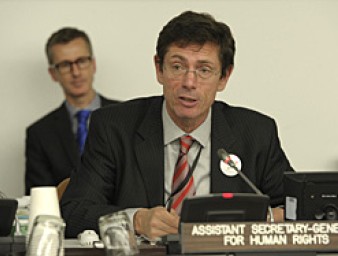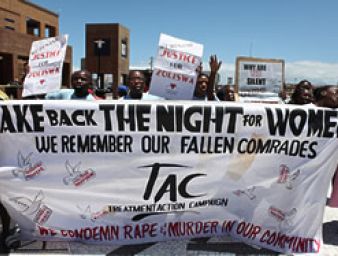Combating homophobic violence against women
01 March 2012
Lesbians, bisexual women and transgender persons in all regions face an elevated risk of violence and discrimination. Action is needed at both national and global levels to ensure their physical safety and to combat acts of discrimination against them.
This was one of the conclusions of a high-level panel discussion held in New York on 29 February 2012 on the margins of the annual session of the United Nations Commission on the Status of Women. The UN human rights office and the governments of Argentina, the Netherlands, Norway, South Africa and the United Kingdom participated in the panel.
UN Assistant Secretary-General for Human Rights, Ivan Šimonović, summarized the findings of the recent study by the human rights office on violence and discrimination against individuals based on their sexual orientation and gender identity. He noted that the report had found “a clear pattern of targeted violence and discrimination directed at people because they are, or are perceived to be, lesbian, gay, bisexual or transgender”. He called on governments to commit to reforms, including dismantling discriminatory laws, ending discriminatory practices and tackling homophobic attitudes through training and public education programmes.
Ministers from the Netherlands, Norway, South Africa and the United Kingdom each spoke about their respective experiences at a national level in overcoming stigma and discrimination against lesbian and bisexual women and transgender persons. In most cases, the process had begun with moves to decriminalize consensual same-sex relationships. Further measures included enactment of legal safeguards against discrimination on grounds of sexual orientation and gender identity.
All panelists spoke of the need to combine legislative changes with other measures designed to tackle discriminatory attitudes, which lie at the root of violence and discrimination against lesbian, bisexual women and transgender persons.
Asked how to deal with cultural objections to homosexuality, South Africa’s Minister for Women, Children and People with Disabilities, Lulu Xingwana, reminded the audience that culture was “man made – made mostly by men!” She pointed out that culture could not justify abuse, adding that while some cultural practices were positive, others, such as female genital mutilation and child marriage, were damaging and should be eliminated.
The role of civil society was repeatedly highlighted. “When people stood up at the Stonewall Inn in New York forty years ago and fought for their rights, the world began to change,” UK equality minister Lynne Featherstone reminded the audience, emphasizing the critical role played in countries around the world by lesbian, gay, bisexual and transgender (LGBT) activists and the broader human rights community.
Change is underway in public attitudes and several panelists referred to the increased level of discussion of issues of sexual orientation and gender identity, both at the United Nations and at the country level in many regions.
The Human Right Council will convene a panel discussion on the subject during its current session on 7 March 2012.
“Our goal”, concluded Šimonović, “is a world free of violence and discrimination against LGBT people, where everyone can enjoy the same rights, regardless of their sexual orientation or gender identity.”
1 March 2012


